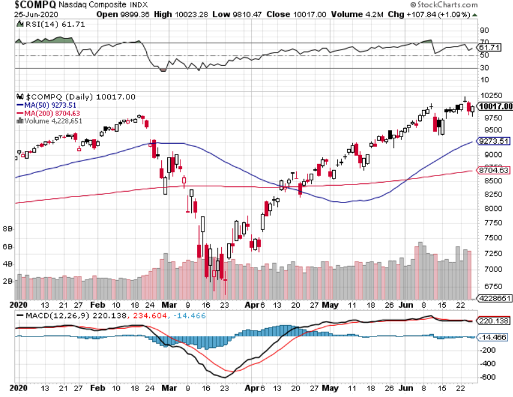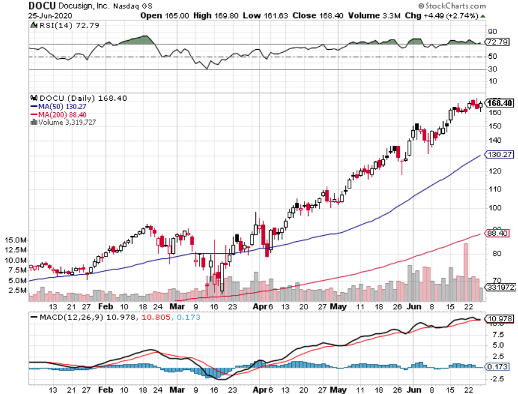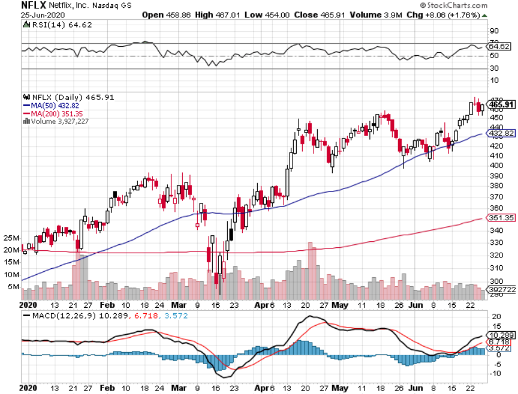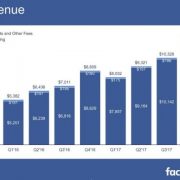Getting Ready for the Second Wave
The coronavirus is dangerously inching towards knocking out the main street economy which would finally land a heavy blow to the tech sector because of the knock-on effect of a substantial drop in future tech budgets.
This leads me to believe that tech stocks are overvalued in the short-term and are due for consolidation.
Daily coronavirus cases have more than doubled from 18,000 to 45,000 as of June 24rd as Americans reclaim the streets and the summer heatwaves kick into gear.
Florida, California, Arizona, and Texas appear to be the new ground zero of the coronavirus and 26 states are experiencing an explosion in cases compared to the prior week.
The blatant disregard for human safety after the reopening means that deaths are likely to spiral out of control in the short-term boding ill for the Nasdaq index but great for shelter-in-place tech stocks.
DocuSign (DOCU), Netflix (NFLX), and Teladoc Health (TDOC) could be in for another run-up.
The jolt in death levels is not baked into tech shares yet, and if things get out of hand, Americans could voluntarily resort back to a shelter-in-place existence.
From March until today, the Nasdaq index has done nothing but sprint upwards due to the eclectic mix of the “re-opening” trade and copious amounts of fiscal stimulus.
If the re-opening trade is killed, the tech market will then go through another contentious referendum to test whether Jay Powell and the Fed are willing to save the equity market yet again.
Propping up the markets ultimately means propping up the tech markets.
If U.S. coronavirus cases re-accelerate from 45,000 to 70,000 then 100,000 per day, the streets could empty out in 1-day.
The risks are certainly to the downside now and the mushrooming of U.S. coronavirus cases could be the catalyst for mass profit-taking in tech names.
Saying the Nasdaq is a little frothy does not mean that tech shares can’t still go higher from here.
They certainly can and there is a legitimate base case surrounding the enormous amount of liquidity sloshing around in the system, meaning that every dip will be bought up.
Then we look forward to the next earnings and news like Apple re-closing 18 stores in coronavirus hot spots doesn’t help.
However, even in the throes of the pandemic, Apple is as innovative as ever - announcing plans to cut ties with Intel during its virtual Worldwide Developers Conference on Monday, saying that it will phase out the use of Intel’s chips in its Mac line of computers over the next two years to use its own in-house chips.
That’s a big deal.
Big tech has so many levers at its disposal.
This goes a long way in a pandemic when specific revenue avenues are blocked off.
Tech is nimble as ever.
Another prime example, after the success of video conferencing software Zoom Communications (ZM), Facebook, Google, and Microsoft posted replica software in a matter of weeks.
Even if their video communication replicas do not catch on, it shows you the vast resources they can muster to harness in whichever direction they please in a blink of an eye.
Many firms are confronting some harsh realities, but investors aren’t penalizing tech firms by selling.
Facebook has seen an ad boycott because of not doing enough against extremism and racism on their platform.
Their algorithms often pit two opposite opinions against each other stoking engagement and more hatred.
Companies including REI, The North Face, Magnolia Pictures, and Upwork have said they won't buy ads on Facebook at least through July as part of a boycott.
The boycott is mostly all bark and no bite and earnings won’t change in a meaningful way.
Uber is a less robust tech firm in the regulatory crosshairs with the state of California about to file court documents that could force Uber and Lyft to reclassify drivers as employees in less than a month.
This could wipe out a small tech company like Uber which is only a $53 billion company.
If the courts rule against Uber, the law would require them to grant drivers employment status while they await the outcome of a pending lawsuit over the issue which would crush the bottom line.
They are having a tough time figuring out how to become profitable.
Investors are doing their best to analyze what the tech industry will look like post-Covid-19 and the assumption is that tech and big tech will dominate which is why any sell-off is temporary.
Every big tech name will survive the pandemic with its business models intact.
Throw in that news of a vaccine and treatment inching forward to fruition and there is a solid bottom for any temporary dip.
It is irrelevant if big tech loses 10% or 20% of revenue this year just as long as they don’t structurally break.





